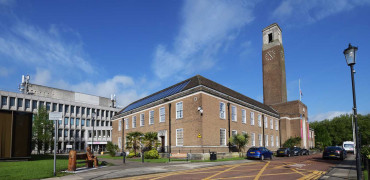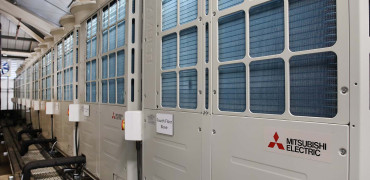When you are running a network of busy, 24/7 gyms across the UK, just how can you provide sustainable showers and hot water for your customers? Carole Titmuss takes a look at a collaboration that points the way to a sustainable future.
The Gym Group Leyland provides residents of the Lancashire town a great gym location, not far from both the town centre and the railway station, with free parking and wi-fi, offering high-quality, low-cost fitness.
As the UK’s first carbon neutral gym chain, The Gym Group is also committed to pioneering sector-leading sustainability initiatives, and enlisted Mitsubishi Electric and Oventrop to deliver a reliable hot water system that can deliver for its members.
Analysis from the Leyland gym has now shown that a gas boiler for the hot water would have cost more each day and produced four times as much carbon every day than using the heat pump solution (*).
- Gas fired water heating would have produced 4 times as much carbon as the heat pump solution – 9.25kg CO2e for gas boiler hot water compared with 2.325kg for the heat pump system
- Gas fired water heating would have cost 18% more each day than the heat pump solution
(*) The gym was monitored in November 2022 with November chosen as a cold month where the temperature of the incoming water would be lower than the yearly average.
A gas boiler would have cost more and produced four times more carbon than the heat pump
How it works
The solution was a Mitsubishi Electric Ecodan QAHV heat-pump working with an Oventrop Regumaq X-80 potable hot water station. This delivers instantaneous hot water without the need for stored water, making it the perfect way to deliver the high temperature, low carbon hot water needed.
https://les.mitsubishielectric.co.uk/products/commercial-heat-pumps-and-chillers/commercial-heat-pumps
The Ecodan QAHV monobloc air source heat-pump is an ideal low carbon renewable technology for hot water generation as it efficiently provides high water temperatures whilst having low embodied carbon. This was important for the Gym Group who are the UK’s first carbon neutral gym chain and have committed to a science-based target to achieve net zero by 2045 .
Oventrop’s Regumaq X-80 potable hot water station supports the QAHV heat pump by supplying instantaneous hot water without needing to store water. This makes it a low risk when assessed for legionella. Regumaq also has multiple control features that ensure low return temperatures back to the thermal store, which in turn helps to maximise the efficiency of the QAHV.
The Gym Group was a pioneer of the low-cost gym model opening its first gym in Hounslow in 2008 and now operates 230 high quality sites across the UK. These gyms offer 24/7 opening and flexible, no-contract membership. As of 30 June 2023, there were 867,000 members nationwide.
The Gym Group Leyland is open 24/7 and offers free fitness classes, top of the range cardio and strength-training equipment, as well as access to personal training services.
Robust and reliable
With a regular demand for hot water for the gym’s showers, the company needed a robust, reliable system that would maximise efficiency and reduce both operating costs and carbon footprint.
Specifically designed for commercial sanitary hot water applications, the QAHV CO2 system can deliver hot water up to 90 degrees Centigrade.
“The QAHV uses R744 refrigerant or CO2, giving it the lowest possible GWP (Global Warming Potential) of 1,” explains Dr. Samira Saravi, Product Manager for Hydronics at Mitsubishi Electric. “Not only can this ensure it complies with strict local planning laws it can also help boost BREEAM points on a project, which is why we are seeing an increase in its specification.”
The decarbonisation of the electricity grid and the UK’s commitment to Net Zero 2050, mean that the QAHV is the perfect solution for reliable, high efficiency, hot water and makes it the ideal low carbon solution for hospitals, hotels, leisure centres and student accommodation.
Finding the ‘sweet spot’
For The Gym Group’s Leyland gym, the QAHV is designed to operate indirectly, feeding a dedicated thermal store, which then links to the Oventrops Regumaq X-80 to deliver the domestic hot water for members. The system also maintains the stratification of the thermal store improving overall system efficiency.
“The Regumaq decreases the temperature returning to the cylinder which in turn decreases the flow temperature going back to the QAHV,” explains Mike Wise, Technical Manager for Oventrop. “This means we find the ‘sweet spot’ for the QAHV and get maximum efficiency from the heat pump, while still delivering the instantaneous hot water needed.”
The Gym Group is also benefiting from the data logging features built in to Regumaq. The pre-installed SD card logs all temperature sensors, relays, pumps outputs and water flow rates. This data is then used to identify daily peak loads and thus optimise the site.
Gas is no longer fit for purpose
Data from Leyland has also proved useful when looking at the design on other gyms within The Gym Group’s sites as Mike Wise explains further: “Most modern hot water systems are still based on gas boiler designs which tended to oversize the equipment installed. This approach is no longer fit for purpose in the age of renewable heating and oversized heat pumps will not only cost the customer more but can actually decrease efficiency.
“Using the data from this gym means we can ensure new sites are not over specified which helps to reduce both the installation and operating costs of the hot water system.”
“We are always looking for innovative ways to reduce our carbon footprint in our gym operations – and this water heating system for our showers is the perfect example of a sustainable solution which delivers for our members and reduces costs in a time of higher energy bills" says David Melhuish, Chief Development and Sustainability Officer for The Gym Group.
“Working with Mitsubishi Electric and Oventrop has given us the opportunity to test a low-carbon water-heating solution that could be applied to other gyms in our estate as we further our carbon reduction, in line with our SBTi-verified targets to achieve net zero by 2045.”
Carole Titmuss is publisher and editor of Refurb Projects magazine




